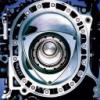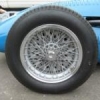It seems to me that the sport is coming to a crossroads. With increasing calls for more competition, closer racing and a smaller gap from back to front, what are your thoughts on whether F1 should be considering more spec parts, cost capping or other such equalizing measures? Or should we instead be calling for less regulation and more technological innovation?

The Future of Formula One: Spec or non-Spec?
#1

Posted 03 April 2018 - 12:44
Advertisement
#2

Posted 03 April 2018 - 12:47
Naturally we need less regulation and more technological innovation, that's the way the Brabham BT48 won against the all conquering Lotus 79.
#3

Posted 03 April 2018 - 12:49
We have spec enough as it is. The problem is 500 people working to get 2 cars to run 20 races.
#4

Posted 03 April 2018 - 13:03
#5

Posted 03 April 2018 - 13:06
Lets face it, 20 teams designing and manufacturing all sorts of little bits and pieces that are more or less the same thing for every team is a bit of a waste, especially in today's high-tech, high-cost world.
Allow innovation in areas that matter, restrict it in areas that don't.
#6

Posted 03 April 2018 - 13:54
It would be the best of both worlds, as small new teams can buy a car off the shelf just like an F2, and the big teams can still make their own stuff. Other midfield teams might change bit and pieces, buy bits off top teams, and also keep other bits as spec. Everyone can simply work to their own budget (and might make for an awesomely close midfield with many near identical cars with their own little changes thrown in).
Of course, the rules would have to be heavily modified for both aero and engine so that big teams making their own racers can get an advantage over the spec cars, but not blow them out the water by 6 seconds a lap or something. Simplified wings and no hybrid systems would have to be a must.
#7

Posted 03 April 2018 - 14:08
There has to be some more spec parts in the future, it really can't go on like this for much longer.
Start with single-source suppliers for things like gearboxes, fuel and oils, brakes and all the bits and pieces that hold the car together then go on from there. Don't want to see things like spec engines and aero parts though, would rather they left that for the teams.
Edited by MikeV1987, 03 April 2018 - 16:18.
#8

Posted 03 April 2018 - 14:14
You'd have to get the teams to agree to more spec or less spec and I don't see that happening either way. The question is "is there a long term future for F1"? The way things have been heading in the last ten years I'd say no.
#9

Posted 03 April 2018 - 14:24
#10

Posted 03 April 2018 - 14:47
IMO:
- Suspension systems and electric side of the PU including BrakebyWire system should be spec.
- The rest of the car should be designed by the teams.
Edited by RainyAfterlifeDaylight, 03 April 2018 - 14:58.
#11

Posted 03 April 2018 - 14:49
Less regulation and more ‘technical innovation’ would do little to help the smaller teams.
By smaller teams, you mean R&D money. But that does not necessarily equate to success.
Innovation can come from anywhere. Look at Neweys work on the Leyton House, the first Jordan, Saubers early success etc.
Big ideas just need the space to be able to grow. Sure, money means 1000 monkeys at 1000 typewriters, but 1 monkey and 1 typewriter is not a total write off.
#12

Posted 03 April 2018 - 14:51
Spec-engines. Chassis and everything else to be developed by teams.
We need to end this engine competition non-sense, I never regarded F1 to be an engine formula, but recent years have definitely transformed it into one.
#13

Posted 03 April 2018 - 14:53
Sorry .. didnt tune in to watch a spec series. I can give some latitude on the power side in order to lower cost (We don't have to have a hybrid for the next formula if its cheaper for example or every engine has to meet a basic crate spec Which guarantees a base horsepower output then the manufacturers add on as they like) but If i cant see the technical innovations on the cars then im out.
Edited by MaxisOne, 03 April 2018 - 15:00.
#14

Posted 03 April 2018 - 14:55
Spec-engines. Chassis and everything else to be developed by teams.
We need to end this engine competition non-sense, I never regarded F1 to be an engine formula, but recent years have definitely transformed it into one.
...and you think Ferrari will agree with that?
#15

Posted 03 April 2018 - 14:59
The reason why the young don't watch F1 is actually quite simple - the sport lacks competitiveness, at least recently. If the sport isn't competitive (and it's not... two, maybe three, teams at the front racing to win and the rest are effectively back-markers), then potential new fans won't watch it. And can you blame them? "Young people" have easily accessible entertainment options, like console gaming and video streaming services. Why bother with a 3 hour F1 race where the action at the front is limited and the chance of a competitive race is exactly that - a chance - when they could attain instant gratification via their PS4?.
When have we had more than 2-3 teams fighting for wins, never mind championships, in (modern, if not ever) F1? If people want races where half the grid has a good chance of winning any given race then there are plenty of other series they would enjoy more, if they don’t mind everyone having an identical car.
For me it’s not worth changing the traditions of the sport, reducing the value of a Grand Prix, to try and cater to these people who have expectations that F1 has never met in all he time plenty of people have been enjoying it.
#16

Posted 03 April 2018 - 15:02
...and you think Ferrari will agree with that?
They either roll with it or grow a pair and actually start that breakaway series they've been yapping about since...forever?
#17

Posted 03 April 2018 - 15:06
They either roll with it or grow a pair and actually start that breakaway series they've been yapping about since...forever?
So i presume your ok with everyone running identical cosworth engines then ? because if there is no competition on power between engine manufacturers then what are they there for ? Where is the marketing incentive for them to participate ?
As ive stated before .. chassis does not power chassis ... the formula has to have a power element to it .. always has in the past .. and to change that is to acknowledge that the power output will be completely spec going forward .. with no incentive for manufacturer investment in f1.
#18

Posted 03 April 2018 - 15:06
They either roll with it or grow a pair and actually start that breakaway series they've been yapping about since...forever?
Or more likely just veto any change and carry on as before.
#19

Posted 03 April 2018 - 15:07
Advertisement
#20

Posted 03 April 2018 - 15:09
Formula 1 is non-spec. However, over the past couple of decades, F1 has become mostly about making a lot of money for the stakeholders. The mass fan-base that F1 is seeking do not really care much about the cars - just the drivers. So, be sure, F1 will move to spec sooner or later.
#21

Posted 03 April 2018 - 15:12
I can't give a black and white categorical answer. Some parts I think deserve near absolute freedom, others should be made to spec in order to preserve the racing and, if possible, help control costs.
For example, I'd like there to be more freedom regarding engines and drive trains, but much less regarding aerdynamical components. The engines are the heart and soul of all racing vehicles; wings, winglets and etc are a mere accessory.
I would also like to see spec steering wheels. Ideally spartan and capable of only a fraction of what they do now. Nursing a car during a race shold be done by the drivers racing and input, not by fooling with nobs and buttons. I think it would increase the importance of proper race craft and possibly open room for more mistakes and battles.
#22

Posted 03 April 2018 - 15:21
The problem is F1 is a procession.
It's a procession because the same teams are winning.
There is little punishment when you are ahead, be it development or an on track mistake.
Think run-offs etc. Bring back gravel traps.
Currently same teams are ahead, others currently cannot catch up so easily.
Others cant catch up because there is zero scope to test things and develop properly.
This lies largely at the engine side being TOO good.
It also lies on the fact everything has to last a long time, and there are budget caps to stop in-season testing.
Everyone raves about the past.
The past was good because it was unpredictable. Why was it unpredictable?
Aside from cowboy racers lasting no more than two races before moving, we had parts fly off and engines fall of the planet race by race.
Even if the titles were won by two driver fights, the third spot on the podium was often different. The battles from 4th-10th were exciting.
More than 12 finishers was 'incredible'.
Simple things that the modern age has done right on by means of improving for monetary and efficiency costs; but as a sport it has dissolved almost exclusively.
Football monopoly is the same.
#23

Posted 03 April 2018 - 15:33
Spec-engines. Chassis and everything else to be developed by teams.
We need to end this engine competition non-sense, I never regarded F1 to be an engine formula, but recent years have definitely transformed it into one.
You never did, however with the exception of some Cossie DFV years, and some V8 engine freeze years, there have always been a big difference between engines in F1...
#24

Posted 03 April 2018 - 15:36
The new owners have come in and seen an opportunity to grow the sport by going more spec and trying to appeal to he wider non-technical minded sports fan. In reality there are already plenty of Motorsport series offering this already, most notably F2 which provides great races frequently and on GP weekends, if you’re willing to look for it. Of course the problem is they lack the superstar drivers and the F1 brand names place in the public consciousness that no amount of promotion would bring. Sadly this may mean F1 as it has always been may not be for very much longer
#25

Posted 03 April 2018 - 15:42
Spec-engines. Chassis and everything else to be developed by teams.
We need to end this engine competition non-sense, I never regarded F1 to be an engine formula, but recent years have definitely transformed it into one.
What are you talking about? Engines have pretty much always been the defining piece of any racing vehicle.
#26

Posted 03 April 2018 - 15:52
Non spec
Non spec.
Something needs to be done but non spec is the future.
#27

Posted 03 April 2018 - 16:14
I would also like to see spec steering wheels. Ideally spartan and capable of only a fraction of what they do now. Nursing a car during a race shold be done by the drivers racing and input, not by fooling with nobs and buttons. I think it would increase the importance of proper race craft and possibly open room for more mistakes and battles.
Remove the buttons and you have to either automate their functions (taking control away from the driver) or remove the electronic systems entirely taking us back to the tech of the late 80s. Remember, before Ferrari put all those functions on the steering wheel in 1996, they were already present as buttons and switches on the dash or on levers next to the driver.
#28

Posted 03 April 2018 - 16:29
Spec-engines. Chassis and everything else to be developed by teams.
We need to end this engine competition non-sense, I never regarded F1 to be an engine formula, but recent years have definitely transformed it into one.
Red Bull fan?
Aero is what is bad for this sport.
#29

Posted 03 April 2018 - 16:35
Spec-engines. Chassis and everything else to be developed by teams.
We need to end this engine competition non-sense, I never regarded F1 to be an engine formula, but recent years have definitely transformed it into one.
F1 has always had the engine as an important part of the equation.
Even during the DFV era that I've frequently heard held up as some sort of precedent for a control engine formula, the field was never 100% DFV (across a season anyway, there may have been the odd race when there was a Maranello area-based "metal workers strike" here and there but I haven't looked that up). And it's not like all the DFV teams had the exact same hardware either, some top teams would get first dibs on developmental parts, whether from Cosworth themselves or through independent tuners that would get involved and offer their services to teams, smaller outfits would often have to make do with older lumps (both in terms of specification and the number of miles on it).
And even during the dark days of the "equalised", frozen-specification V8s, aside from it being a massive anomaly in the history of the sport, there were still ways the engine made a bit of a difference, whether through fuel economy, cooling requirements, exhaust blowing etc.
#30

Posted 03 April 2018 - 16:53
We have spec enough as it is. The problem is 500 people working to get 2 cars to run 20 races.
On 3 engines. With very little testing.
#31

Posted 03 April 2018 - 17:17
The principle is already established: Formula One is a spec series. That's what a formula is: a specification. The only question is how far you go with it. The engines are tightly specified at the moment, down to the number of cylinders, what regeneration components are permitted, and even certain external dimensions. The same applies to much of the bodywork (to restrain aerodynamics) and the structure (for safety purposes).
F1 cars need to change. Why? To make the costs sustainable, and close racing possible. This is nothing to do with stopping Mercedes from dominating. That's a false goal.
There's no escaping it, we need to make a big change, simplifying the drive train, standardising various car elements, and restricting aerodynamics ever more tightly.
Edited by Sterzo, 03 April 2018 - 17:18.
#32

Posted 03 April 2018 - 17:27
So i presume your ok with everyone running identical cosworth engines then ? because if there is no competition on power between engine manufacturers then what are they there for ? Where is the marketing incentive for them to participate ?
As ive stated before .. chassis does not power chassis ... the formula has to have a power element to it .. always has in the past .. and to change that is to acknowledge that the power output will be completely spec going forward .. with no incentive for manufacturer investment in f1.
This is one of the worst things that could happen since... forever! I'm all for reducing the gaps and tighter racing, but I want to still watch Formula One, NOT Formula Cosworth (since you gave this example, but regardless of the engine manufacturer....it's available for all of them, including Ferrari; Only one engine manufacturer would be the final nail in F1's coffin for me!).
Edited by Ramon69, 03 April 2018 - 17:28.
#33

Posted 03 April 2018 - 17:28
We have spec enough as it is. The problem is 500 people working to get 2 cars to run 20 races.
Reduce the head count available to each team. You shouldn’t need 1000 people to run 2 cars for 20 races. Then decrease the amount of spec parts.
Those are contradictory outcomes. When you design, manufacture and assemble a vehicle that complex in a compressed time frame you need that many people. It would require more people if everyone built their own engines. You can't call for fewer people and fewer spec parts. It doesn't work like that. The labor has to scale with the effort in order to meet the time frame. Haas thought they could do it with fewer than they have now but they have about 50 people more than originally planned. They targeted 150 but ended up just over 200. And that is using some resources in the US to run the business aspect. To do CF lay up and fab it would take another 50-100, suspensions 20-30, brakes 10-15, hydraulics and electronics another 30-40 and pretty soon you're at 400-500 people. That's just what modern F1 has scaled to require.
#34

Posted 03 April 2018 - 17:38
Remove the buttons and you have to either automate their functions (taking control away from the driver) or remove the electronic systems entirely taking us back to the tech of the late 80s. Remember, before Ferrari put all those functions on the steering wheel in 1996, they were already present as buttons and switches on the dash or on levers next to the driver.
Spec steering and spec ECU should limit a lot of what can be programmed. And they can also easily limit what adjustments can be made from anywhere, on or off the steering wheel.
I hope...
#35

Posted 03 April 2018 - 18:02
Ideally non spec but I wouldn't lose my mind if they had some spec parts in certain areas in the PU and chassis to improve things as long as there was still plenty of areas that weren't.
#36

Posted 03 April 2018 - 19:03
I actually think the manufacturers should be obliged to offer more parts for sale to the smaller teams, not only will it reduce costs for the smaller teams in R&D and staffing, it creates a competitive environment for parts production, again driving down costs.
Edited by Bartonz20let, 03 April 2018 - 19:03.
#37

Posted 03 April 2018 - 19:25
I also think it'd be clever to go ahead and decide a bunch of costly, highly anti-racing (that difficult overtaking or promote economy racing) parts of the car to go spec, and remain open in some other areas. This would bunch up the field, save costs, improve the racing, and still retain an element of proper sporting competition between teams, if more limited than in the past.
#38

Posted 03 April 2018 - 20:57
I think the Haas debate presents opportunity for F1.
I actually think the manufacturers should be obliged to offer more parts for sale to the smaller teams, not only will it reduce costs for the smaller teams in R&D and staffing, it creates a competitive environment for parts production, again driving down costs.
But the downside comes from making the smaller teams even more dependent on the manufacturers, and leaving them less able to compete once the manufacturer pulls out. The independence of the customer teams will also be increasingly questioned, as the more a team utilises a competitor to construct its car, the greater sway the manufacturers over its decisions. It's bad enough already, with the way Toro Rosso and Sauber often appear to play second fiddle.
#39

Posted 03 April 2018 - 21:08
Those are contradictory outcomes. When you design, manufacture and assemble a vehicle that complex in a compressed time frame you need that many people. It would require more people if everyone built their own engines. You can't call for fewer people and fewer spec parts. It doesn't work like that. The labor has to scale with the effort in order to meet the time frame. Haas thought they could do it with fewer than they have now but they have about 50 people more than originally planned. They targeted 150 but ended up just over 200. And that is using some resources in the US to run the business aspect. To do CF lay up and fab it would take another 50-100, suspensions 20-30, brakes 10-15, hydraulics and electronics another 30-40 and pretty soon you're at 400-500 people. That's just what modern F1 has scaled to require.
If you put limits on the number of personnel, they may not be able to achieve everything they want to. But every team would be in the same position - having to do the best job they can, given the time frame and the number of employees. Haas probably increased their workforce because they need to do the same as the others are doing in the same time frame.
Edited by pdac, 03 April 2018 - 21:08.
Advertisement
#40

Posted 03 April 2018 - 21:35
What are you talking about? Engines have pretty much always been the defining piece of any racing vehicle.
They have, but once upon a time F1 was more than just an engine formula, which can't be said about the current era. There weren't such massive differences in the V8 era as there are now. Engine plays such a big part now that consumption and longevity of the power unit components are the primary source of discussion. Mercedes and Ferrai are in a different league in comparison to Renault, let alone Honda and in 4 years, there's hardly been any change.
#41

Posted 03 April 2018 - 21:37
Red Bull fan?
Aero is what is bad for this sport.
No, not a Red Bull fan actually, a Kimi fan but if it suits your agenda...
Aero in its current form is bad for the sport, there are different forms of aero though.
#42

Posted 03 April 2018 - 22:07
...and you think Ferrari will agree with that?
Does it matter? Let's just wait for their contract and veto to expire and they can go and play somewhere else if they don't like it.
#43

Posted 03 April 2018 - 22:22
It seems to me that the sport is coming to a crossroads. With increasing calls for more competition, closer racing and a smaller gap from back to front, what are your thoughts on whether F1 should be considering more spec parts, cost capping or other such equalizing measures? Or should we instead be calling for less regulation and more technological innovation?
If my grand-kids generation won't have to learn to drive (the oldest id 5) what makes you think "motor sport" will have any appeal to them at all.
If F1 survives at all with a few of that generation as it's fans, as well as the post 2030 ban on petrol powered cars, having a few spec parts will be a very small price to pay.
#44

Posted 03 April 2018 - 23:02
They have, but once upon a time F1 was more than just an engine formula, which can't be said about the current era. There weren't such massive differences in the V8 era as there are now. Engine plays such a big part now that consumption and longevity of the power unit components are the primary source of discussion. Mercedes and Ferrai are in a different league in comparison to Renault, let alone Honda and in 4 years, there's hardly been any change.
But there were large differences in engine performance in every era preceding the frozen V8s. And seriously large differences, with cars 10-20 seconds off the pace - even 30 seconds for Life - and so unreliable you could count the number of laps they completed without issue on your hands. Even Honda are closer to the front than the private backmarkers of previous decades.
The V8 era was an aberration. Formula One was meant to be about building the best car and engine, or acquiring them if you could not produce one yourself, and if you didn't have them you persisted until you did, or gave up and found something else to do. The idea that the engines should be roughly equal in performance, or that every team has a right to the engine of their choice, is a modern notion found in some fans and certain teams who have no perspective of the sport before 2006.
So yes, F1 should remain a series where competitors design and build their own cars, and the drivers race with the machinery they are given. That may lead to periods of dominance and other teams may never do as good a job, but that is unavoidable without destroying the entire concept of this sport.
#45

Posted 03 April 2018 - 23:14
It seems to me that the sport is coming to a crossroads. With increasing calls for more competition, closer racing and a smaller gap from back to front, what are your thoughts on whether F1 should be considering more spec parts, cost capping or other such equalizing measures? Or should we instead be calling for less regulation and more technological innovation?
GET RID OF FRONT AND REAR WING, MAKE THE CAR SMALLER AND MOUNT HIGHTECH ENGIN.
#46

Posted 03 April 2018 - 23:14
the team wil find the way to go around the track faster sooner that you think.
#47

Posted 03 April 2018 - 23:30
If my grand-kids generation won't have to learn to drive (the oldest id 5) what makes you think "motor sport" will have any appeal to them at all.
If F1 survives at all with a few of that generation as it's fans, as well as the post 2030 ban on petrol powered cars, having a few spec parts will be a very small price to pay.
The kids who go to watch the Red Bull air races have never flown a plane. The majority of the viewers of Wimbledon have never held a tennis racket. Almost nobody who watches the Olympics has jumped off a high dive platform or thrown a discus or a javelin. And I'm sure plenty of F1 fans don't have driving licences or have any interest in road cars.
You don't need to have any direct connection to the activity to watch and enjoy a sport.
#48

Posted 03 April 2018 - 23:35
How can you have the WDC and the WCC decided at the same time? It's an obvious contradiction. To herald the driver of the car that can't lose as proof that he is the world's best driver is absurd. And no one realizes it more than that driver himself.
Endurance racing is where innovation should be proven and showcased.
A spec series is where the differences among drivers are most clearly revealed.
These truths have been ignored all along because, well, nothing was going to be done about it so you either enjoy it, imperfect as it is, or don't.
Not even Todt and Brawn are likely to upend the golden applecart but there it is, if you care to see it as it is.
#49

Posted 03 April 2018 - 23:39
The kids who go to watch the Red Bull air races have never flown a plane. The majority of the viewers of Wimbledon have never held a tennis racket. Almost nobody who watches the Olympics has jumped off a high dive platform or thrown a discus or a javelin. And I'm sure plenty of F1 fans don't have driving licences or have any interest in road cars.
You don't need to have any direct connection to the activity to watch and enjoy a sport.
No but it helps though. It's no coincidence horse racing was more popular when people had more connections to horses.
#50

Posted 04 April 2018 - 01:53
Those are contradictory outcomes. When you design, manufacture and assemble a vehicle that complex in a compressed time frame you need that many people. It would require more people if everyone built their own engines. You can't call for fewer people and fewer spec parts. It doesn't work like that. The labor has to scale with the effort in order to meet the time frame. Haas thought they could do it with fewer than they have now but they have about 50 people more than originally planned. They targeted 150 but ended up just over 200. And that is using some resources in the US to run the business aspect. To do CF lay up and fab it would take another 50-100, suspensions 20-30, brakes 10-15, hydraulics and electronics another 30-40 and pretty soon you're at 400-500 people. That's just what modern F1 has scaled to require.
Then those internal time frames will have to be increased. All teams would be on an even playing field. Haas had to hire more people because they are competing against others employing more people. If standards are a tiny bit lower across the board, nobody watching would bat an eyelid.
They have, but once upon a time F1 was more than just an engine formula, which can't be said about the current era. There weren't such massive differences in the V8 era as there are now. Engine plays such a big part now that consumption and longevity of the power unit components are the primary source of discussion. Mercedes and Ferrai are in a different league in comparison to Renault, let alone Honda and in 4 years, there's hardly been any change.
F1 isn't currently an "engine formula". If it was, a Renault engined team would not be able to get ahead of any Ferrari or Mercedes engined cars.




































